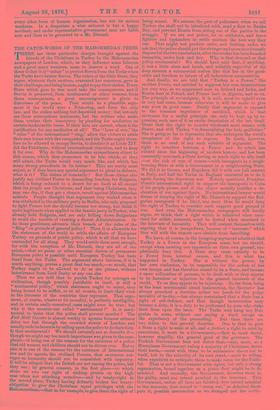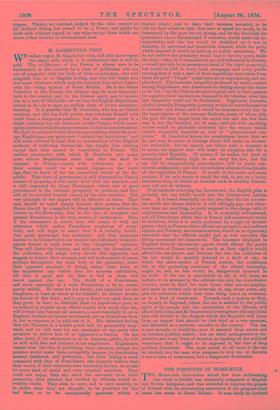THE CATCH-WORDS OF THE MAHOMMEDAN PRESS.
TIMBRE are three particular charges brought against the 1 friends of the Christians in Turkey by the Mahommedan newspapers of London, which, as they influence some Liberals and a good many waverers, seem to deserve a word. One of these is that it is "unfair" to protect Servia from the Turks when the Turks have beaten Servia. The rulers of the little State, they argue, whatever their motives, overrated her resources, gave in their challenge, and being beaten, ought to pay their stakes. Every State which goes to war must take the consequences, and if Servia is preserved, from sentimental or other reasons, from those consequenoes, a great encouragement is given to disturbers of the peace. That would be a plausible argu- ment if the world were a Prize-ring, and force the only law, and the stakes nothing but deposited money ; but not only are these assumptions inaccurate, but the writers who make them confess their inaccuracy by pleading for mediation on certain inadmissible bases. If their data are correct, where is the justification for any mediation at all ? The "laws of war," the " rules " of the international "ring," allow the victors to settle their own terms with the vanquished, and the Turks ought there- fore to be allowed to occupy Servia, to desolate it as Louis XIV. did the Palatinate, without international objection, and to keep it for ever. Why do the Mahommedan sympathisers object to this course, which they pronounce to be fair, which, as they will admit, the Turks would very much like, and which has many strong precedents in its favour? They are surely most unjust, or if they have any special argument to plead in defence, what is it ? The claims of humanity ? But those claims also justify any civilised Power in demanding freedom for Bulgaria, which is being reduced to a desert for no fault at all except that its people are Christians, and that being Christians, they may one day, if they get a chance, revolt against Mahommedan misrule. People thought that argument very wicked when it was attributed to the military party in-Berlin, who only proposed to fight France lest she should become too strong, but think it quite legitimate when applied to the fanatic party in Turkey, who already hold Bulgaria, and are only killing down Bulgarians to avoid the trouble of creating a decent Administration. Or do these gentlemen advocate their breach of the rules of the "Ring" on grounds of general policy? Then it is allowable for the statesmen of the world to settle the affairs of European Turkey on grounds of public policy, which is all that we have contended for all along. They would settle them soon enough, for with the exception of Mr. Disraeli, they are all of one mind,—that no peace or other essential datum of permanent European policy is possible until European Turkey has been freed from the Turks. The argument about fairness, if it is worth anything, proves a great deal too much,—so much, that Turkey ought to be allowed to do as she pleases, without interference from Lord Derby or any one else. Then we are told that to punish Turkey for outrages on civilisation, though possibly justifiable in itself, is still a "sentimental policy," which statesmen ought to reject, they being bound to be selfish, or at all events, to limit their view to the interests of the countries they represent. That argu- ment, of course, whatever its morality, is perfectly intelligible, and in certain easily-conceived cases might even be true ; but why is the counter-one called "sentimental I" Is it senti-
mental to insist that the police shall prevent murder? The Pall Mall Gazette is almost weekly in agonies because cabmen
drive too fast through the crowded streets of London, and
usually ends its laments by calling upon the police to do their duty. Is that sentimental ? We should certainly not so describe it—
though we might say too much importance was given to the com- plaint—it being one of the reasons for the existence of a police that old women and children should not be driven over. But so also it is one of the reasons for the existence of International Jaw and its agents, the civilised Powers, that enormous out- rages on humanity should not be committed with impunity. It will be alleged that the British are not among the police, but they are ; by general consent, in the first place—to which alone we owe our right of sinking pirates on the high seas when not attacking ourselves—and by treaty-right in the second place, Turkey having defiantly broken her treaty- obligation to give the Christians equal privileges with the Mahommeclans,—that is, for example, to give them the right of every other form of human organisation, has not its serious being armed. We assume the part of policemen when we tell i weakness. In a despotism a wise autocrat s but a happy [ Turkey she shall not be interfered with, send a fleet to Besika accident, and under representative government men are liable Bay, and prevent Russia from aiding one of the parties in the struggle. If we are not police, let us withdraw, and leave fighters and bystanders to settle matters the best way they can. That might not produce order, and desiring order, we ask that the police should put the stronger and more murderously disposed of the two combatants, after the weaker has been knocked insensible, under lock and key. Why is that demand or that policy sentimental ? We should have said that, if anything, it was a little stern and harsh, and selfishly regardful of the deep interest a commercial nation like this has in the good- order and freedom to labour of all industrious communities.
And finally, we are told that "Turkey is a Power," like another Power, and entitled to suppress her own insurrections her own way, as we suppressed ours in Ireland and India, and Russia hers in Poland, and France hers in Algeria, and so on. The principle of sovereignty, it is said, must be upheld even in very bad cases, because otherwise it will be made to give way even in good cases. Surely that argument is opposed to the common experience of mankind, which is that reverence for a useful principle can only be kept up by re- pressing such uses of it as excite detestation of the law itself. Grant that the right to murder wholesale must remain with States, and still Turkey "is demoralising the holy guillotine." She is going so far in repression that she endangers the world's acceptance of the right to repress. In truth, however, there is no need of any such subtlety of argument. The right to interfere between a Power and its rebels has existed since the beginning of modern history, and has been constantly exercised, a State having as much right to ally itself —at the risk of war, of course—with insurgents in a neigh- bouring State as with a Government in a neighbouring State. We did it in Greece, and Napoleon did it with our full consent, in Italy, and half the Tories in England entreated us to do it again during the American war. Nobody questions President Grant's international right to support the insurgents in Cuba if his people please, and if the object morally justifies a de- claration of war against Spain. No international lawyer would dream of denying the right of Mr. Disraeli to support the Bul- garian insurgents if he liked, any more than he would deny the right of Turkey to consider such support good ground of war. And even the Mahommedan newspapers will hardly argue, we think, that a right which is admitted when exer- cised for selfish interests, must be denied when exercised in the interests of humanity. They will content themselves with arguing that it is inexpedient, because of " interests " which they will with the utmost care abstain from describing.
We have, of course, in the foregoing argument admitted that Turkey is a Power in the European sense, but we should, except when meeting our opponents on their own ground, em- phatically deny this. A State may cease entirely to be a Power from internal causes, and this is what has happened in Turkey. She is without the power, by her own confession, to be responsible for the action of her own troops, and has therefore ceased to be a State, and become a mere collocation of persons, to be dealt with as they appear to be harmless or injurious to the general interests of the world. To us they appear to be injurious. So far from being in the least sentimental about insurrection, the Spectator has always preached a doctrine rather too harsh for the pulpy morality of to-day,—has always maintained that a State has a right of self-defence, and that though insurrection may become a duty, it is a duty to be performed by men who stake their lives upon the issue. The Turks may hang any Bul- garian in arms, without our saying a word except on the expediency of the proceeding. But than there are two riders to this general doctrine. One is that to give a State a right to exist at all, and a fortiori a right to exist by executions, it must be a Government,—that is, must desire, however stupidly, the general good of the governed. The Turkish Government does not desire that,—nay, must, as a Muesulman Government ruling a majority of Christians, desire their harm,—must wish them to be submissive slaves not to itself, but to the minority of its own creed,—must be willing when expedient to extirpate them to make room for the Faith- ful. That is not a Government with rights, but only a strong organisation, bound together as a pirate fleet might be to do mischief. And secondly, the Government, however stern to the guilty, must not intend mischief to the innocent. This Government, unless all facts are falsified, does intend mischief to the innocent, does intend to "stamp out," as Admiral Slade puts it, possible insurrection as we stamped out the cattle-
plague. Turkey, we contend, judged by the rules current in all civilised State& has ceased to be a Power, and might be dealt with without regard to any rules except those which are above 'either treaties or international laws.



































 Previous page
Previous page